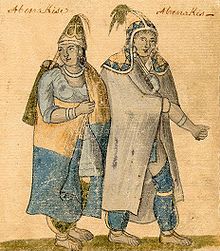Wαpánahki | |
|---|---|
 | |
| Total population | |
| ~21,000 | |
| Regions with significant populations | |
| Canada | 18,420 (2021)[1] |
| Quebec | 16,400[2] |
| United States (Vermont, New Hampshire, Maine), self-identified | 2,544 (2000)[3] |
| Languages | |
| Abenaki, French, English | |
| Religion | |
| Abenaki mythology (Wabanaki), Christianity | |
| Related ethnic groups | |
| Other Algonquian peoples Especially Wolastoqiyik, Mi'kmaq, Passamaquoddy, and Penobscot | |
| People | Alnôbak (Wôbanakiak) |
|---|---|
| Language | Abenaki (Alnôbadôwawôgan), Plains Indian Sign Language (Môgiadawawôgan) |
| Country | Dawnland (Ndakinna) Wabanaki |
The Abenaki (Abenaki: Wαpánahki) are Indigenous people of the Northeastern Woodlands of Canada and the United States. They are an Algonquian-speaking people and part of the Wabanaki Confederacy. The Eastern Abenaki language was predominantly spoken in Maine, while the Western Abenaki language was spoken in Quebec, Vermont, and New Hampshire.
While Abenaki peoples have shared cultural traits, they did not historically have a centralized government.[4] They came together as a post-contact community after their original tribes were decimated by colonization, disease, and warfare.
- ^ "Canada Census Profile 2021". Census Profile, 2021 Census. Statistics Canada Statistique Canada. May 7, 2021. Retrieved January 3, 2023.
- ^ "Québec Census Profile 2021". Census Profile, 2021 Census. Statistics Canada Statistique Canada. May 7, 2021. Retrieved January 3, 2023.
- ^ Cite error: The named reference
UXLwas invoked but never defined (see the help page). - ^ Lee Sultzman (July 21, 1997). "Abenaki History". Archived from the original on April 11, 2010. Retrieved March 20, 2010.